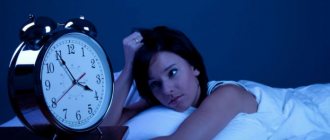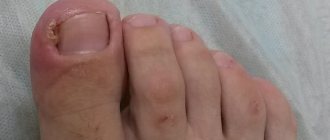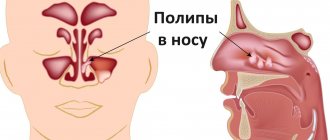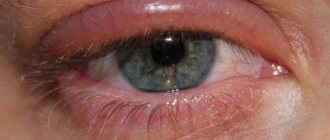Insomnia is a sleep disorder that is one of the most common. The medical term for insomnia is insomnia.
A person needs to sleep 7-8 hours a day. At the same time, the normal biological rhythm assumes that we sleep at night (in the dark) and are awake during the day. Life is structured in such a way that we still have to stay awake during the day (work, errands, etc.). And if we fail to get enough sleep at night, our performance decreases. First of all, intellectual abilities suffer. Trouble concentrating may occur, making the person vulnerable to accidents and injuries. Chronic insomnia is especially dangerous. In this case, the person becomes irritable and nervous, there is a general deterioration in health, immunity decreases, and memory deteriorates.
Typically, insomnia refers to the lack of sleep during that period of the night that a person reserves for sleep. There is an intention to fall asleep, but sleep deceives and does not come. From a medical point of view, the concept of insomnia is broader - it is not just insufficient duration , but also inadequate quality of sleep . If a person sleeps, but often wakes up during the night and ultimately does not get enough sleep, this is also insomnia. Another type of insomnia is difficulty falling asleep . Normally, a person falls asleep in the interval from 3 to 15 minutes. With insomnia, the process of falling asleep can take up to 2 hours or more. Waking up too early
also considered as a variant of insomnia: a person wakes up before the right time and can no longer fall asleep.
Manifestations of insomnia also include post-somnia disorders : if a person, after a night spent in bed, feels sleep-deprived, feels tired, weak, lethargic, this also indicates that his sleep is disturbed.
Prevention of insomnia: how to avoid insomnia
By following these sleep hygiene rules , you will speed up the process of falling asleep and ensure higher quality sleep:
- Ensure the bedroom is darkened and soundproofed. If sound insulation is poor, use earplugs or a white noise generator. Lowered curtains will protect you from early sunlight and light flashes on the street. When waking up, on the contrary, you need to raise the curtains or turn on the light - this will give your body vigor;
- optimize the temperature regime. The best air temperature for sleeping is 15.5-18.3°C. The air should be fresh, so try to leave the window open. In winter, slot ventilation is suitable;
- the bed should be comfortable, the mattress should be thick enough, the blanket should not be too hot;
- Don't drink alcohol in the evening. It will ruin your sleep;
- Don't drink coffee in the afternoon. Caffeine is eliminated from the body within 12 hours or more;
- do not overeat at night;
- Organize your bedtime so that you take a bath 1-2 hours before you go to bed. An evening bath helps relax muscles and is therefore good for sleep; but the procedure itself is stimulating, and if you go to bed straight from the bath, it may be difficult to fall asleep;
- don't smoke in bed;
- lead an active lifestyle; do exercises; take a walk in the fresh air. The greatest activity should occur in the first half of the day. In the evening, before going to bed, it is useful to take a walk so that you feel moderate physical fatigue;
- do not sleep during the day, especially after 4 pm;
- learn to relax. Find your own way to relieve emotional stress. “Counting sheep” is not recommended: counting requires concentration, and concentration interferes with sleep;
- take care of your health. Pain caused by a chronic disease, as a rule, reminds itself at night, receding into the background during the day. It’s worth doing it as soon as possible; among other things, it will return the quality of your sleep.
What is insomnia?
Insomnia is the most common sleep disorder that patients complain to their doctor about. It determines both the quality of the night spent and the quality of the next day. Insomnia is a disruption of normal sleep patterns that impairs quality of life . With insomnia, the following are possible:
difficulty falling asleep ( sleep disorder ),
difficulty sleeping through the night without waking up ( sleep maintenance disorder ),
waking up too early in the morning ( morning insomnia ).
Insomnia is characterized by difficulty sleeping at night. But it affects not only the night: severe insomnia at night - drowsiness during the day. Insufficient or poor quality sleep can lead to fatigue, poor concentration, memory loss or decreased work efficiency, and even traffic accidents. Long-term sleep problems can, among other things, influence the development of obesity, diabetes and a compromised immune system. Insomnia must be treated.
DO YOU KNOW?
Even while we sleep, our brain works and plays an important role in eliminating toxins, processing information, strengthening memory, learning and other higher brain functions.
Primary vs Secondary Insomnia
When a person has trouble sleeping that is not associated with any other health problem, it is called primary insomnia.
Secondary insomnia occurs when sleep problems are initially caused by something else, such as illness
(depression, heartburn, asthma, arthritis, dementia),
pain, taking medications
or certain substances (alcohol, caffeine).
Only a doctor can select effective remedies and methods for treating insomnia; traditional recipes for insomnia can only make it worse.
Acute vs Chronic insomnia
According to the duration of the process, insomnia is divided into acute or chronic. Sometimes acute insomnia is caused by a specific problem (such as a stressful life event or illness). When a person has trouble sleeping at least three times a week for at least three months, we are talking about chronic insomnia. In this case, people, as a rule, are very worried about their sleep and try to get rid of insomnia at least at home.
Treatment of neurosis in Moscow
Yusupov Hospital is a multidisciplinary medical center. We treat insomnia using modern techniques that allow you to normalize sleep in the shortest possible time. We provide treatment in both inpatient and outpatient settings.
A favorable environment in the clinic together with a friendly team sets you up for a successful treatment outcome. The Yusupov Hospital is equipped with new generation diagnostic equipment, which allows for accurate diagnosis of diseases. Our specialists regularly improve their qualifications, receive scientific titles and master modern methods of treating insomnia.
To make an appointment for a consultation, call the phone number. Our operators work around the clock and will make an appointment at a time convenient for you.
Symptoms of insomnia
If you take the entire population, then a third of them will find at least one symptom of insomnia. Women suffer from insomnia twice as often as men. The causes of insomnia may differ between men and women. Insomnia is also age-related: it is very rare in childhood, sometimes in teenagers, but is becoming more common among adults and older people.
Symptoms of insomnia occur at night, but its consequences can occur the next day. People who complain of insomnia say they have difficulty falling asleep in the evening, wake up frequently during the night, or wake up too early in the morning. Such sleep does not help restore strength or the quality of sleep is very poor. Of course, in this case, the main desire of a person is to wake up rested, but in the case of a sleepless night, people get tired and suffer.
Symptoms that may appear the next day:
lack of energy and motivation, which leads to difficulty making decisions
problems with memory and concentration
anxiety
irritability or mood swings that lead to problems in family and social life
daytime sleepiness
behavioral problems (eg, impulsivity, aggression)
apathy or fatigue
constant thoughts about sleep and a feeling of dissatisfaction from this
in addition, muscle tension, headaches, and digestive problems are possible
How to get rid of insomnia using folk remedies? You must first understand where it came from, and only a doctor can say for sure. Fighting insomnia at home is often simply unrealistic; don’t delay going to the doctor.
DID YOU KNOW?
Epidemiological studies have found that a third of European adults have experienced one or more symptoms of insomnia, and 10–15% of respondents noted that severe insomnia interferes with the normal functioning of the next day.
Ten provocateurs-causes of insomnia and how to deal with them
Now let's talk about factors that interfere with healthy sleep and can provoke insomnia.
Night trips to the toilet
This is one of the most common reasons that prevents you from sleeping at night. Night trips to the toilet can be associated with many factors. From drinking too much before bed, the effects of taking medications and pregnancy, to various health problems such as prostatitis, urinary tract infections, chronic diseases, etc. If this happens regularly, then you should definitely contact a urologist, he will eliminate the possible causes of insomnia in men.
Hormonal changes
Very common causes of insomnia in women are menstruation, pregnancy, menopause... all of these stages can make hormone levels unstable, and along with them, disrupt sleep and cause insomnia. Sleep patterns may be disrupted by hot flashes and increased sweating, breast tenderness and frequent urination. One possible option is to wear sleepwear that absorbs sweat well, thereby solving the problem of night sweats. Here, to treat insomnia, you need to equalize hormonal levels.
Anxiety
This is one of the most common causes of poor sleep at night. Insomnia with depression and neurosis is, alas, commonplace. During the day, your brain is busy with various events, but at night, when you slow down and have nothing to distract you from your thoughts, stress and anxiety keep you awake. And the more you concentrate on the problem, the longer it is impossible to fall asleep. How to overcome such insomnia? Try KRKA's breathing exercises or read a book just to keep your mind occupied and away from stress and anxiety.
Environment
Too bright, too noisy, too cold, too hot... Bedroom conditions have a bigger impact on your sleep than you think. Some people say that the optimal temperature in the bedroom ranges from 16° C to 20° C. It is easy to get rid of this cause of insomnia at home. Heavy, stale air in the room also causes problems with sleep, so immediately before going to bed, make sure that the room is well ventilated and there is access to fresh air.
Food and drink
Caffeine, sweets, fatty or spicy foods can all cause awakening in the middle of the night. Insomnia after alcohol is also common. Late night snacking causes fluctuations in blood sugar levels, which can lead to sleep problems. Therefore, instead of greasy pancakes, eat something light a few hours before bed, this will help overcome such insomnia.
Sleeping with your phone
The blue spectrum of light emitted by screens disrupts the circadian rhythm, making it difficult to fall asleep and stay asleep. You've probably already noticed: you go to bed feeling really sleepy, then you turn on your phone just to check a few things, and the sleepiness immediately goes away. How to fall asleep if you suffer from insomnia? Remove the means of communication first! For a good night's sleep, try to avoid all electronic devices that emit blue light in the bedroom. But if you really can't give them up, turn on the Night Mode feature, which reduces blue light, or use any other similar app.
Pain
From back pain, headaches to chronic pain, any pain can cause you to lose sleep. How to deal with such insomnia? Try to help yourself with a warm shower or heating pads, but if all else fails, do not hesitate to consult a doctor.
Jet lag - time zone change
Rapid change of time zones affects biological rhythms. It always takes time for the body to adapt to a new day and night schedule. Regularly moving across different time zones can cause chronic sleep problems. What helps with such insomnia? Consultation with a competent specialist who will select the optimal daily regimen and supporting medications. It is impossible to get rid of such insomnia at home on your own.
Snore
Maybe you snore, or maybe your partner. The latter is especially difficult if you are a light sleeper. Co-sleeping can be a real challenge, especially at the beginning of a relationship. In any case, to avoid waking up at night, try to find the cause of your snoring. Here you need to treat insomnia comprehensively, consult a therapist. Keep in mind that in some cases, snoring is a symptom of sleep apnea, a disorder associated with other serious medical conditions.
Shift work
Shift work can disrupt your circadian rhythm and cause sleep problems. What helps with such insomnia? A few tips: try to create as regular a sleep-wake schedule as possible, make sure you use blackout curtains to completely block out daylight in the bedroom, limit caffeine intake, calls, and the likelihood of guests while you sleep.
Regardless of the reason, the fact remains that sleep is interrupted and with it its quality is lost. Constantly waking up and falling asleep makes you feel like you haven't slept even an hour during the night, and morning exhaustion is monstrous. How to deal with insomnia in this case? Just make sure you're aware of all the things that keep you up at night and take preventative measures to prevent it from happening again the next night.
Prevention
Certain preventive measures can help prevent a critical condition:
- Set a clear bedtime and stick to it strictly. The optimal time for falling asleep is considered to be from 22-00 to 23-00;
- Avoid drinking caffeine and other energy drinks after 8 pm;
- Create comfort in the sleep and rest area;
- Be sure to do morning exercises and lead an active lifestyle during daylight hours;
- Don't overeat in the afternoon.
If you adhere to all the recommendations listed, then you will not experience insomnia, and experienced specialists at our clinic will tell you what to do at the first signs of it. To make an appointment with a neurologist in our clinic for sleep disorders, call or contact us through the feedback form. The operator will make an appointment with a specialist at your earliest convenience. We care about your health!
FIND OUT PRICES
How much sleep do you need and what are the consequences of lack of sleep?
Normally, an adult needs seven to nine hours of sleep a night. For some, six is enough, but this is rather an exception to the rule. A decrease in the quality or duration of night sleep leads to disruptions in the functioning of almost all organs and systems of the body. Let's look at some of the effects of insomnia.
Nervous system
It is quite obvious that when she suffers from insomnia, she is the first to suffer.
During sleep, pathways form between nerve cells in the brain that help you remember new information. Insomnia causes the brain to be unable to perform its duties normally. It becomes difficult to concentrate or learn something new. Signals sent by the body may be delayed, reducing coordination skills and increasing the risk of accidents.
Insomnia negatively affects mental abilities and emotional state. The person becomes more impatient or prone to mood swings. This compromises decision-making processes and creativity. If you do not get rid of insomnia in time, hallucinations may begin. Other psychological risks: impulsive behavior, depression, suicidal thoughts.
DO YOU KNOW?
There is such a concept - “micro-sleep” - in a state of exhaustion due to lack of sleep, a person falls asleep for just a few seconds, but these few seconds, for example, while driving, can cost one’s life. With insomnia, this condition very often occurs suddenly and cannot be controlled.
The immune system
While you sleep, the immune system works - it produces special protective substances that fight infections - bacteria and viruses. Insomnia prevents the immune system from building its strength. If you don't get enough sleep, your body doesn't have enough strength to fight. This is why people suffering from insomnia take much longer to recover because the consequences of insomnia hit them hard.
Respiratory system
The connection between quality sleep and the respiratory system is very close. Sleep apnea (sleep breathing disorder) interrupts sleep and reduces its quality. When you're up all night, sleep deprivation sets in, leaving your body vulnerable to respiratory infections like colds and flu. If left untreated, insomnia can worsen existing respiratory conditions.
Digestive system
Along with overeating and lack of exercise, insomnia is another risk factor for overweight and obesity. Sleep affects the levels of hormones that control feelings of hunger and fullness. There is such a hormone - leptin. It tells the brain that you are full. Without enough sleep, your brain lowers leptin levels and increases levels of another hormone, ghrelin, which stimulates appetite. The action of these hormones can explain late-night snacking or a heavy late-night dinner. Insomnia may leave you with no energy to exercise; without sleep, fatigue becomes your companion. What helps with such insomnia? A healthy diet and healthy lifestyle.
The cardiovascular system
Sleep affects processes that support heart and blood vessel function, blood sugar levels, and blood pressure. It also plays a vital role in the body's ability to repair blood vessels and the heart. People who don't get enough sleep are more likely to suffer from cardiovascular disease.
Endocrine system
Hormone production is dependent on sleep. For example, testosterone production requires at least three hours of uninterrupted sleep. Waking up in the middle of the night affects hormone production. This is critical for children and adolescents—interruption of sleep can affect the production of growth hormones. They help build muscle mass and repair cells and tissues. The pituitary gland continuously releases growth hormones, but sleep and exercise also promote the release of this hormone.
DO YOU KNOW?
Lack of sleep can negatively affect your critical attitude to current events. Insomnia at night means sleepiness during the day, and this significantly impairs the ability to make sound judgments. In such a state, a person simply cannot adequately assess the situation and act wisely.
What to do if you have insomnia? Consult a doctor, especially if you experience insomnia due to depression! People who have been deprived of normal sleep for long periods of time tend to misjudge what their lack of sleep is doing to them. In a fast-paced world, working on less sleep has become a source of pride. But sleep experts disagree - if a person thinks that he sleeps less and everything is fine, he is mistaken. Insomnia must be treated by a professional; folk remedies for insomnia can only make it worse.
When to see a doctor?
A constant state of uncomfortable and irregular sleep can entail a risk of developing chronic diseases, impaired immune function, obesity, chronic fatigue and overwork, and mental disorders.
If you cannot cope with the problem on your own, you need to contact a neurologist or somnologist who specializes in sleep disorders.










